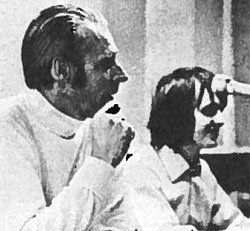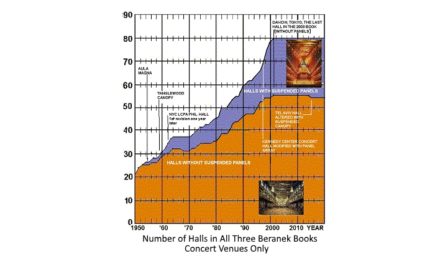WW: Would you, for example, use close miking?
GM: Yes. Most classical records are made like photographs of concerts, if you know what I mean—aurally speaking. The ultimate aim is to reproduce as naturally as possible the sounds of the orchestra as created in the concert hall.
Now I think this is terribly limiting. I mean it’s been done, and it continues to be done better and better because engineers and acoustics and recording techniques have advanced enormously. But I think we’re missing out on something. I think that if Beethoven or Bach were alive today, they would call that a very timid approach, and I think they would go back to first base and say, “You’ve got tremendous tools here; let’s use them.” And I think if you go back to the actual music and adopt, really, very modern recording techniques and produce a work of art which is different from what you hear in the concert hall, and not necessarily inferior which most people might think.
WW: Then the rock producer presently has more room for creativity?
GM: Unquestionably. That’s what appeals to me.
WW: (Before A.I.R. Studios were built) Your responsibilities also include selection of the studio and engineer?
GM: Yes.
WW: In recording a rock group, will you attempt to capture a “live” studio performance, or will you construct a recording using, for example, overdubbing.
GM: I’m afraid the latter is true. One doesn’t go for a performance as such in the studio because you know darn well that if you do that there are going to be shortcomings in various other departments. You might get a great vocal performance, and the bass line may not be so great. So, there are various things that you can do-you can go and overdub the bass line if you’ve got good enough separation.
You’ve seen us working recently … what I was trying to do yesterday, in fact, with Peter, with the whole group, was to try to concentrate on Peter’s performance tying to get something out of him, and then worrying about the rest of it.
But in fact we’ve reversed the process today because we’ve decided that Peter will probably do as good a performance by overdubbing anyway. So we’re going back to first base and concentrating on the actual sound. It doesn’t seem to impair the total result. Most rock recording is done that way today. You obviously get a much better sound on everything; you are able to pay much more attention to detail.
WW: You mentioned before the importance of psychologically understanding the group. Could you be more specific?
GM: It’s just instinct really a kind of sixth sense you build up. You’ve got to get to know people and sense what’s happening.
WW: Would you say that a sense of humor is important?
GM: Oh yes, a sense of humor is terribly important. Absolutely. If you didn’t have a sense of humor on rock dates, then everybody would go sour. I can’t bear people who take themselves loo seriously, including rock musicians.
WW: Do you find that you do a lot of producing during the mix down stage as well as during the recording stage?
GM: It depends on the artist and the record you’re making, and what techniques you’re using. If you’re making a record like Sgt. Pepper, for example, the mixdown is just as complicated, in fact more so, than the original recording because you’re painting a picture in sound and you’re using extra things: you’re bringing in sound effects, you’re distorting sounds, you’re playing with them, you’re soil of shaping them-sculpting them, if you like — and mixing them down at the same time.
So that kind of production is probably more complicated and more important in the mixing stage than at any other time. But if you did that all your life, you’d be spending all your time mixing and none of it recording.



